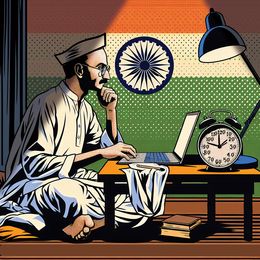Narayana Murthy got trolled two months ago for advocating a 70-hour work week. L&T boss S.N. Subrahmanyan added 20 more hours to the work week, and put it out more nastily. He wondered how long people can stare at their wives on holidays.
Spot on, Sir, but pity the women! What more can one do to one’s wife than stare at her, if one has come home after slogging for 90 hours?
The problem with Murthy and Subrahmanyan was that they sounded crass. They made slogging a virtue, and having fun with family a vice. Sorry, gentlemen! There are a good number of lesser mortals—god-fearing, tax-paying, and loyal-to-wife—who work 70 or more hours.
There’s a difference, however. Unlike Murthy or Subrahmanyan, they don’t talk about their work or their wives, yet love both. They keep their homes happy, colleagues contented, juniors looked after, and bosses pleased, but never brag or preach. They pat their performers, nudge the laggards, guide the dim and have fun with all. They make everyone work with them willingly, without sounding like slave-drivers. They are the ones who manage work-life balance.
The best examples are our neta log. Have you ever heard a minister, an MP, or an MLA brag about the number of working hours he or she puts in? Believe me, most of them work many more hours than does Murthy or Subrahmanyan. Most of them work late into the night, and yet are up, about and out before the crack of dawn—long before Murthy opens his laptop, Subrahmanyan turns on the switchgear he divested, or the early bird flies out for its worm. And most of their aides, too, are in attendance at unearthly hours, without even a murmur of complaint or a whimper of wail.
Or look at our babu log. Knock at any senior officer’s home late in the night, and the odds are that you will find him or her poring through mountains of files. So Murthy and Subrahmanyan, slogging may be a virtue, but bragging about it isn’t. As ITC’s Sanjiv Puri said, better to empower your colleagues to do more than make them slog. Or, to quote Anand Mahindra: "It's not the number of hours you put in but the quality of work that counts."
Now the government’s economic adviser Anantha Nageswaran has taken the debate to a cerebral level. The Economic Survey authored by him and team cites WHO and ILO studies to caution against long working hours. It can affect your mental health.
Not that the survey is a charter of trade union demands. On the contrary, it advises flexible rules, and incentive-based work schemes that help companies to profit, workers to earn, spouses to enjoy, and the country to prosper. The Nageswaran team should know. They had slogged for more than 90 hours a week to bring out the survey, but haven’t bragged about it.
Remember, mankind has travelled long from the days of ancient slavery, mediaeval feudalism, and post-industrial exploitative factory capitalism to achieve the modern welfare state. Read some economic history. If you can’t stand treatises, get a copy of Dickens’s Hard Times.
Moreover, simply slogging doesn’t get you gains that last. Look at Napoleon. The guy slept for just four hours a day, and probably spent the remaining 20 hours plotting conquests and planning battles. But the empire that he slogged to build didn’t even outlast him.
And who put the value of work and play better than his final foe Wellington? “The battle of Waterloo was won on the playing fields of Eton,” the Iron Duke is said to have remarked. True or not, the line highlights the value of recreation in life’s successes.
prasannan@theweek.in


